Related Research Articles
Yeshu is the name of an individual or individuals mentioned in rabbinic literature, thought by some to refer to Jesus when used in the Talmud. The name Yeshu is also used in other sources before and after the completion of the Babylonian Talmud. It is also the modern Israeli spelling of Jesus.

Peretz (Peter) Smolenskin was a Russian-born Zionist and Hebrew writer.
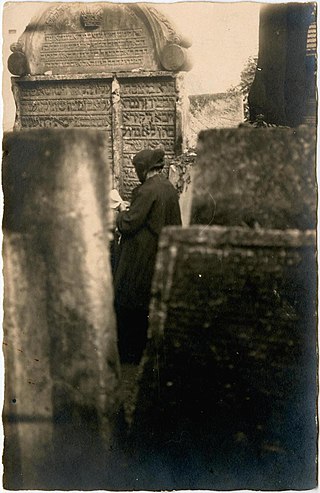
Joshua ben Alexander HaCohen Falk was a Polish Halakhist and Talmudist, best known as the author of the Drisha and Prisha commentaries on the Arba'ah Turim as well as Sefer Me'irat Enayim (סמ"ע) on Shulkhan Arukh. His name also occurs as the Hebrew acronyms רפ"כ ("RaFaC"), מהרו"כ ("Ma-HaRWaC"), and מהר"י כ"ץ.
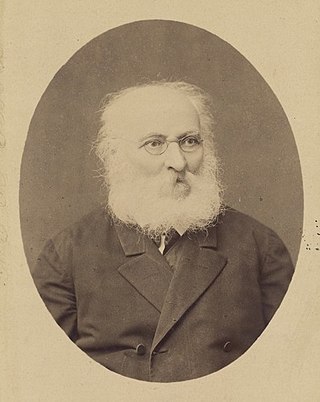
Avrom Ber Gotlober, also known by the pen names Abag and Mahalalel, was a Russian Maskilic writer, poet, playwright, historian, journalist and educator. His first collection was published in 1835.

Micah Joseph Lebensohn (Hebrew: מיכה יוסף הכהן לעבענזאָהן, romanized: Mikhah Yosef ha-Kohen Lebenzohn;, also known by the pen name Mikhal, was one of the foremost poets and translators of the Haskalah in Vilna. He is best known for his innovative narrative Biblical romances and pantheistic nature poetry, influenced by the Romantic movement. These are characterised by "a deep pathos and a beauty of expression," and noted for their "expression of the young poet's strong longing for life and of the dread of an early dissolution which preyed on his mind."
Hillel Noah Maggid (1829-1903) was a Russian-Jewish genealogist and historian.
Abraham Lewysohn was a Hebraist and rabbi of Peiskretscham, Upper Silesia. He left a large number of manuscripts, several hundred sermons in Hebrew and Danish, novellæ on the Talmud, verses, a German work on Hebrew grammar, and a work titled Dorot Tannaim wa-Amoraim, a history of the Tannaim and Amoraim, the introduction to which, titled "Parnasat chakme ha-Talmud," was published in Kobak's Jeschurun.
Gabriel Judah Lichtenfeld was a Jewish-Polish maskilic mathematician, poet, and author. He wrote for Ha-Shachar, Ha-Tzefirah, Izraelita, and Polish newspapers, mostly on mathematical topics.

Samuel Joseph Fuenn, also known as Rashi Fuenn and Rashif (רשי״ף), was a Lithuanian Hebrew writer, scholar, printer, and editor. He was a leading figure of the eastern European Haskalah, and an early member of Ḥovevei Zion.
Sefer Toledot Yeshu, often abbreviated as Toledot Yeshu, is a medieval text which presents an alternative, anti-sectarian view, as well as a disputed biography of Jesus of Nazareth. It exists in a number of different versions, none of which is considered either canonical or normative within Rabbinic literature, but which appear to have been widely circulated in Europe and the Middle East in the medieval period. A 15th-century Yemenite version of the text was titled Maaseh Yeshu, or the "Episode of Jesus", in which Jesus is described either as being the son of Joseph or the son of Pandera. The account portrays Jesus as an impostor.
Leser Landshuth was a German Jewish liturgiologist.

Abraham Jacob Paperna was a Russian Jewish educator and author.

Moshe Smilansky MBE was a pioneer of the First Aliyah, a Zionist leader who advocated peaceful coexistence with the Arabs in Mandatory Palestine, a farmer, and a prolific author of fiction and non-fiction literary works.
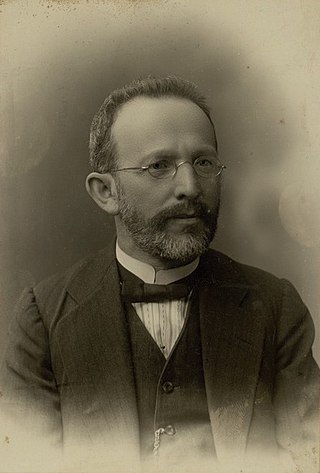
Samuel Leib Zitron, also known as S. L. Citron, was a Hebrew and Yiddish writer, historian, and literary critic. He contributed to the Yiddish press and to nearly all the Hebrew periodicals in the Diaspora over 50 years.
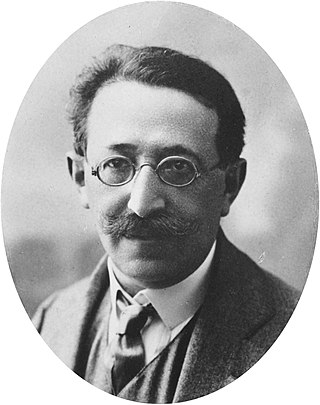
David ben Saul Frischmann was a Hebrew and Yiddish modernist writer, poet and translator. He edited several important Hebrew periodicals, and wrote fiction, poetry, essays, feuilletons, literary criticisms, and translations.
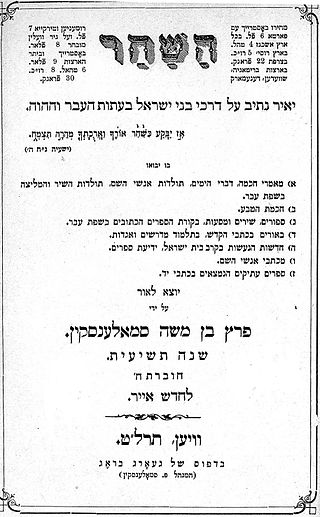
Ha-Shaḥar was a Hebrew-language monthly periodical, published and edited at Vienna by Peretz Smolenskin from 1868 to 1884.
Asher Simcha Weissmann was an Austrian Hebraist, rabbi, writer, and editor.
Lazar Lipman Hurwitz was a Russian Jewish editor and writer.
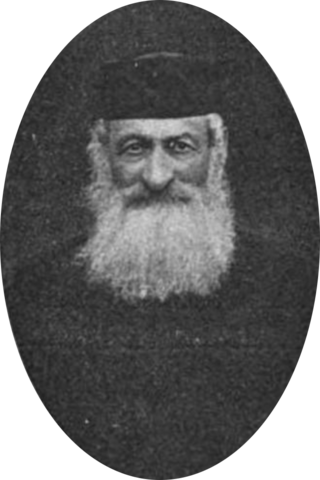
Solomon Zalkind Minor was a Lithuanian-Russian rabbi and writer.

Alter Druyanov was a Russian Jewish writer, editor, translator, folklorist, journalist, historian of early Zionism, and Zionist activist. His pen name derived from his birthplace, Druya, was variously transliterated as Druyanow, Drujanow, etc.) He wrote both in Yiddish and Hebrew languages.
References
- Sokolov, Sefer Zikkaron, p. 64.
 This article incorporates text from a publication now in the public domain : Singer, Isidore; et al., eds. (1901–1906). "Joshua Lewinsohn". The Jewish Encyclopedia . New York: Funk & Wagnalls.
This article incorporates text from a publication now in the public domain : Singer, Isidore; et al., eds. (1901–1906). "Joshua Lewinsohn". The Jewish Encyclopedia . New York: Funk & Wagnalls.